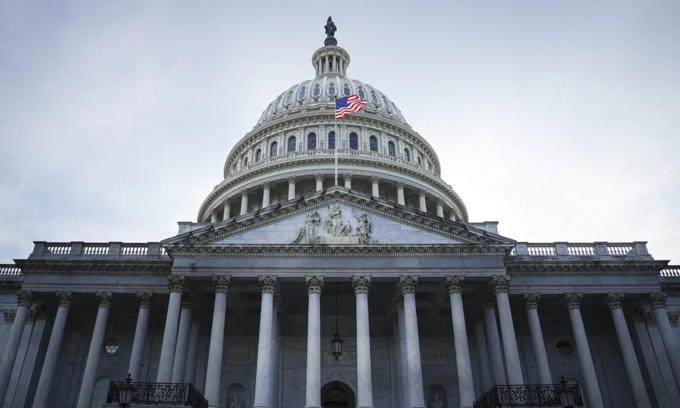The House Rules Committee on April 11 advanced a modified version of a bill to reauthorize Section 702 of the Foreign Intelligence Surveillance Act (FISA).
The rule, which passed the committee in an 8–4 party-line vote, will now be teed up for a vote on the House floor.
The FISA legislation included in the rule is a modified version of Rep. Laurel Lee’s (R-Fla.) Reforming Intelligence and Securing America Act that would extend the controversial spying authority for two years.
The rule agreed to in committee will also allow for a vote on an amendment requiring a warrant to look at Americans’ data swept up in the warrantless foreign surveillance program.
The modified bill’s passage by the Rules Committee comes after an earlier draft of the bill was rejected by 19 Republicans, who joined all Democrats earlier this week to reject the rule, feeling that it didn’t go far enough to reform the system and protect civil liberties.
The bill would reform Section 702, which passed in 2008 and allows intelligence officials to gather information on foreign actors working outside of the United States.
However, since the bill was narrowly reauthorized by Congress in 2018, a series of abuses have come to light that have thrown the future of the entire process into question.
These issues have divided Congress and spurred the formation of unlikely alliances across party lines on both sides of the issue.
In 2021, it was discovered that 3.3 million queries on Americans had been made under Section 702.
Though there were fewer the next year, nearly 300,000 queries were still discovered.
The same mechanism was used to improperly spy on former President Donald Trump’s 2016 campaign during the ill-fated Crossfire Hurricane investigation of the president, which was predicated on the false notion that his campaign was working with Russia.
What’s in the Reform Bill?
In response to these and other reported abuses, Ms. Lee’s bill would make some changes to how information is collected and the safeguards around such actions.
It would primarily strengthen requirements to “ensure that applications to the Foreign Intelligence Surveillance Court … that target United States persons are accurate and complete.”
Other provisions would dramatically cut the numbers of those allowed to perform and authorize FISA queries, which proponents say would help ensure that the law is followed.
Another provision would mandate a flat prohibition on using Section 702 to collect evidence of a crime.
These reforms “will make clear this is an intelligence tool, not a law enforcement tool,” House Intelligence Committee Ranking Member Jim Himes (D-Conn.), a supporter, said during an earlier Rules Committee hearing.
It also strengthens penalties for illegal queries, imposing a fine or up to 10 years in federal prison for violations.
Finally, it would make it easier for Congress to exercise oversight of the program.
But privacy advocates have bristled at the bill, which they feel doesn’t go far enough to address the abuses brought to light over the past several years—specifically in its absence of a warrant, the key issue that has divided Congress in handling FISA reauthorization.
It’s unclear whether the warrant amendment will pass, as members of both parties have expressed support for, and opposition to, a warrant requirement in equal measure.



















What happened to the “foreign” part of the program? Shouldn’t be using it on US citizens at all
GIve them an inch, they WILL ALWAYS steal a mile. TOO OFTEN THEY have proven that to be fact.
SO WHY KEEP GIVING THEM the inch??
Am I the only one to notice that there are NO modifications for abusing the FSIA act? Especially for spying on American citizens and presidential Canidates that the deep state doesn’t like…??? And certainly, no consequences for the judges that just rubber stamp the requests?
So, what is happening is tyranny as usual can be expected from your tyrannical government alphabet soup agencies and the courts that give their blessing to the tyranny!
86 Republicans Vote To Allow Warrantless Spying Of Americans With FISA
86 Worthless Sickening Traitorous Republicans just stabbed the American people in the back.
Is there really any reason to support this traitorous party any further ?!?
https://dailycaller.com/2024/04/12/house-republicans-fisa-warrant-amendment/
Nope. Right now, i am seriously considering not even BOTHERING To vote this november, as these traitors in the GOP keep proving, time and time again, there is nO POINT in voting for so-called conservatives….
NOT voting would be stupid, would be my opinion.
BUT If the GOP KEEPS acting like the cowards, and backstabbers they are, in literally caving into the leftist ideology/agenda, WHY VOTE for them!?
We already know the justice department abused their FISA power so why in the name of h*ll would any conservative in Congress reauthorize it. It is clear the FBI is more concerned about so-called Christian Nationalists, angry parents, pro-lifers, and 1/6 protesters than they are the people who orchestrated 9/11. They have spared no resources in tracking down everyone who was at the Capitol on 1/6 yet terrorists continue to breach our borders and the feds seem unable or unwilling to stop them. Who does the justice department fear the most? Patriots who want to restore the authority of “We the people” in government and make Washington accountable, not terrorists.
Add to that, HOW DAMN Many instances have we heard AFTER a mass shooting/school shooting or terrorist incident, that “THEY were on the FBI’s radar”, but they did nothing…?
What the hiddle is the point in ‘watching’ and monitoring them, if NOTHING IS GOING TO be done?